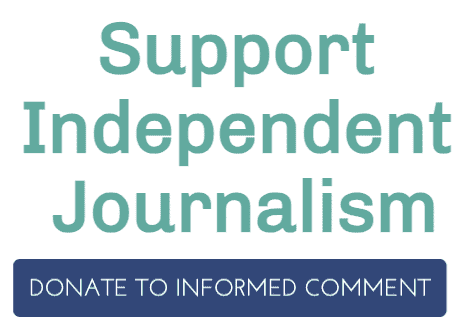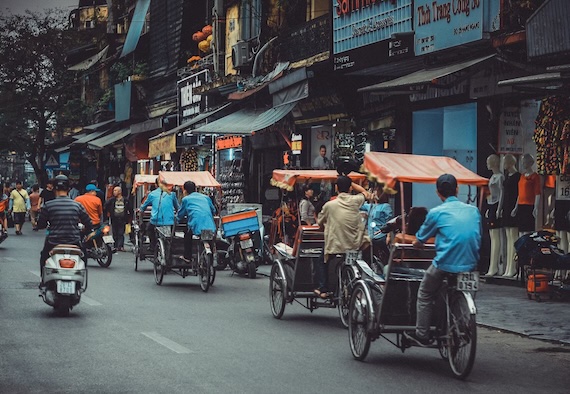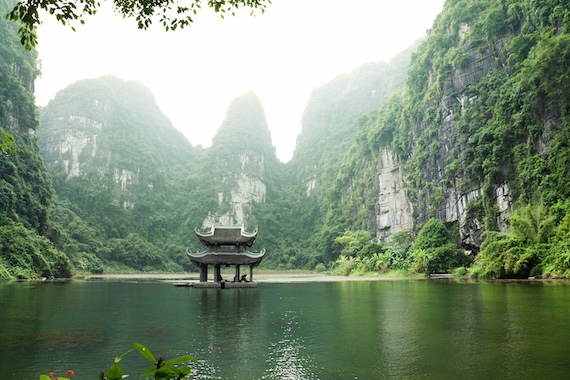Greenfield, Mass. (Special to Informed Comment; Feature) – This year 2025 is the 50th anniversary of the liberation of Vietnam from the “American War.” The war officially ended in 1973 but the remaining Americans fled South Vietnam in chaotic air and sea lifts two years later as North Vietnam forces invaded to unite their country. Vietnam then became the Socialist Republic of Vietnam with its capital in Hanoi while Saigon was renamed Ho Chi Minh City. The war left more than 3 million mostly Vietnamese civilians and 56,000 American military dead as well as the newly coined ecocide, named for the destruction of up to 40 percent of Vietnams’ forests, mangroves and farmlands by the herbicide Agent Orange.
Seven US presidents sequentially punished this small, agrarian Asian country for fear of their choosing a socialist form of government; then for defeating the American military; and, later, out of spite for uniting as a socialist country
President Eisenhower clairvoyantly warned of the U.S. falling under the control by the military industrial complex–unwarranted influence wielded by a partnership between the military and a growing cohort of U.S. weapons contractors–while he deceptively set the stage for the US war against Vietnam. He prevented elections in 1956 for a unified Vietnam because he knew the popular nationalist hero and socialist Ho Chi Minh would be elected president.
His successor President Kennedy simultaneously delivered the most humanistic peace speech at American University in 1963 of any US president, sought peace with the Soviet Union, and also read with great admiration Rachel Carson’s Silent Spring. Yet, he surreptitiously ordered the US spraying of Agent Orange in Vietnam in 1961 in US planes disguised with South Vietnam insignia so the U.S. would not be accused of chemical warfare. Presidents Johnson and Nixon sustained the genocide-like war on the Vietnamese and ecocide of their environment. One US general opined that Vietnam could not be defeated unless our government bombed it back to the Stone Age.

Or by check:
Juan Cole
P. O. Box 4218,
Ann Arbor, MI 48104-2548
USA
(Remember, make the checks out to “Juan Cole” or they can’t be cashed)
When we lost the war with Vietnam, Nixon did agree to pay Vietnam $3.25 billion for reconstruction aid and $1.5 billion in commodities (together worth $35.25 billion today); however, he was impeached before this agreement was honored. His successors Presidents Ford and Carter, smarting from defeat by a poor, agrarian country, retaliated by refusing to pay the promised reconstruction aid. Congress then annulled the agreement with Vietnam. Under these and future presidents, our government set out to punish Vietnam by:
- vetoing Vietnam’s membership in UN, (until 1977 when the re-united Socialist Republic of Vietnam entered the UN);
- maintaining an economic and trade embargo until 2000;
- persuading European allies to do the same; and
- blocking international aid.

File photo of Vietnam by Tran Phu on Unsplash
This period of penalizing the country which defeated us is known as the Second American War in Vietnam.
America’s sole reliance on military power; their ignorance of/disinterest in the history, culture and values of Vietnamese life; and their underestimate of the Vietnamese iron will for independence explains the US defeat. While the Vietnamese resistance used political and diplomatic strategies as well as military, the United States never assigned any experts to explore diplomacy to negotiate an end to the war. In its conceit, it refused offers for mediation from French President de Gaulle in 1963 and UN Secretary U Thant with de Gaulle in 1967.
* * *
In March of 2014, I traveled through Vietnam from Hanoi in the North to Da Nang in central Vietnam to Ho Chi Minh City in the South. The purpose of my journey was to investigate the plight of third- and fourth-generation Agent Orange-dioxin victims, the fate of dioxin-contaminated sites and the extent of ecological restoration needed. I visited models of community-based care for Agent Orange victims that rival our best ones for differently-abled children, staffed by people who spoke of the children as their family. I found that those working to rid Agent Orange from the Vietnam environment harbor no antipathy to American citizens, while they clamor for justice from the US government to pay for the health and environmental costs of ecocide.

File photo of Tràng An, Ninh Bình, Vietnamby Rowan Heuvel on Unsplash
More than a dozen “Peace Villages” have been built for child victims. Here residents receive rehabilitative care and physical therapy, and those able to learn are prepared for higher education or taught vocational skills, such as sewing, flower-making, and fabricating incense sticks. Hundreds more Peace Villages are needed for the estimated tens of thousands of multigenerational victims.
Never miss an issue of Informed Comment: Click here to subscribe to our email newsletter! Social media will pretend to let you subscribe but then use algorithms to suppress the postings and show you their ads instead. And please, if you see an essay you like, paste it into an email and share with friends.
Like many US visitors to Vietnam before me, I found a people who are forward-looking and forgiving; a poor country climbing its way admirably out of poverty to lower-middle-income; and a country determined not to leave their victims of Agent Orange behind. Perhaps most telling of their spirit is the response of a Vietnamese veteran when asked by US veteran James Zumwalt why Vietnamese are not bitter toward Americans. “We Vietnamese have small bodies,” he replied. “If we fill them with hate, there is no room for love”—a well of wisdom from which we Americans could draw.


 © 2026 All Rights Reserved
© 2026 All Rights Reserved